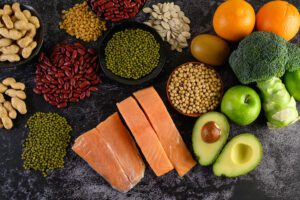Here, we are sharing information on the topic “6 supplements for headache.” Although we typically associate doctors with drugs and surgery, top headache clinics include specialists who may counsel patients on an integrative migraine treatment plan that incorporates vitamins and supplements.
6 supplements for headache
1. Feverfew

-
“The evidence is very mixed and I am not a big fan of feverfew based both on the very inconsistent results of studies and the fact that it may be difficult to achieve adequate concentrations of the active ingredients in feverfew extracts,” cautions Lipton.
-
Herbal tea with a hint of bitterness, liquid drops, and capsules are available forms of feverfew.
2. CoQ10

-
The natural substance that your body produces is called Coenzyme Q10 (CoQ10). It can be purchased as an oral dietary supplement as well. Although there is little evidence for CoQ10, it functions similarly to B2/riboflavin.
-
Lipton suggests, “I usually start patients with riboflavin because it’s honestly much less expensive and has a little bit more research behind it. However, I believe they are just as successful.
3. Sleep melatonin

-
“Melatonin has been shown to work in doses of 3 mg a day, although the best evidence wasn’t available at the time the AAN wrote its guidelines,” says Lipton. In fact, based on the most recent studies he reviewed, my headache specialist gave it to me in 2018 at a dose of 10 mg per day.
-
Lipton went on to say, “The reason melatonin has less proof is that guidelines become outdated nearly immediately after they are published. And that is encouraging, since it indicates that we are moving forward.
4. Magnesium
-
According to Lipton, magnesium may have a function in preventing migraines. “Taking magnesium supplements can be helpful as a preventive measure, but it can also cause cramps and diarrhea in certain individuals.
-
Magnesium was categorized by AAN under the second category of evidence. You can also obtain adequate magnesium by consuming specific nutrient-dense meals.”

5. B2 vitamin
-
“I tell people it’s the ‘great free swing’ in migraine prevention, and by that, I mean you take 200 mg twice a day; effects develop over a couple of months, but don’t expect to see benefits immediately,” says Lipton.
-
Though not quite free, vitamin B2 is reasonably priced and has no known safety concerns. Double-blind trials have shown that it is actually pretty good at preventing migraines.
6. Butterbur

“The only one that compares favorably in terms of efficacy to the best prescription medications, such as topiramate and divalproex sodium, is a butterbur plant extract supplement called Petadolex. It is beneficial at doses of 75 milligrams (mg) twice daily, according to a few blind studies,” Lipton stated.
Frequently asked questions
(6 supplements for headache)
What is the best supplement for headaches?
Answer: The conclusion is that the top 5 vitamins and supplements for preventing migraines are
If a person cannot take medicine, they may be interested in using dietary supplements to prevent or treat migraine attacks. According to some study, melatonin, coenzyme Q10, magnesium, vitamin D, and vitamin B2 can all aid with migraines.
What vitamin helps tension headache?
Answer: B vitamin
Headaches can be avoided by taking supplements of vitamin B to replenish those depleted energy stores. The vitamins in the vitamin B complex are known to increase energy levels, but vitamin B12 is especially beneficial for treating headaches.
Does vitamin C stop headaches?
Answer: Further research is necessary to establish the possibility that taking vitamin C supplements will help lessen the frequency and intensity of migraines.
What deficiency causes headaches?
Answer: Headaches can result from shortages in certain nutrients, including magnesium, riboflavin, omega-3, omega-6, and vitamin D. We can identify the appropriate course of treatment by performing laboratory testing to evaluate nutritional deficits.
Conclusion
(6 supplements for headache)
In conclusion, there is evidence that certain supplements, including melatonin, coenzyme Q10, magnesium, riboflavin (vitamin B2), feverfew, and butterbur, may help reduce headaches, especially migraines. Although they target neurotransmitter modulation, mitochondrial function, and inflammation, they offer potential treatment; however, prudence and expert supervision are essential. Individual reactions differ, and it’s important to take into account any potential drug interactions. A thorough approach to headache relief is ensured by using these supplements together with lifestyle modifications in a comprehensive headache management plan. To ensure safe and efficient therapy, speaking with a healthcare professional before beginning any supplements is imperative.
So, this is how the topic “6 supplements for headache” has been addressed.
- For more information related to these topics, click here.
- You may also visit our Instagram page by clicking here.
- You may also visit our YouTube channel by clicking here






